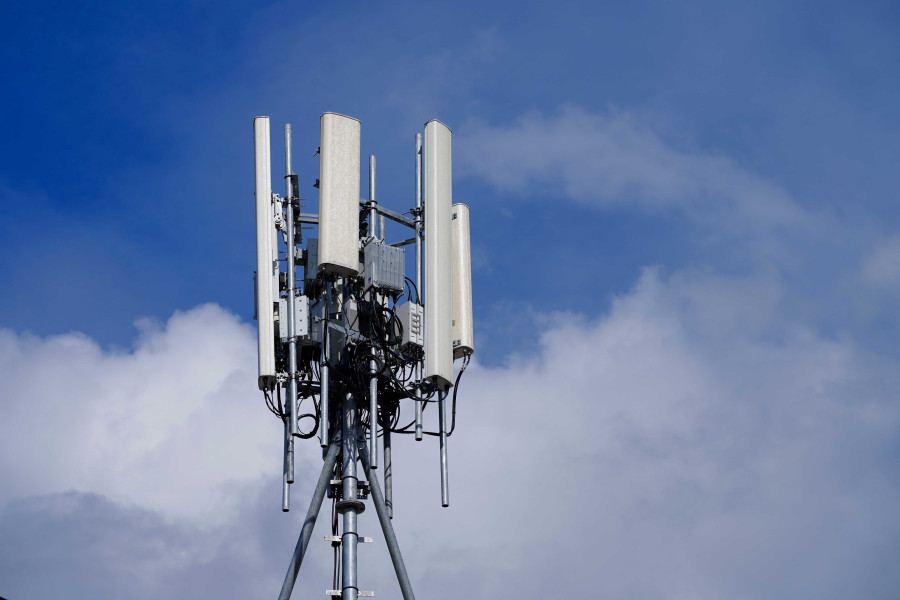Money
Telecom authority implements infrastructure sharing bylaw
The regulation allows several telecom companies to use the same installations like towers and fibre networks, freeing them from having to build their own.
Krishana Prasain
The Nepal Telecommunications Authority has implemented the infrastructure sharing bylaw, which is expected to ease the financial burden for service providers and bring down costs, even as Nepal gears up for the rollout of 5G wireless service.
Infrastructure sharing is a concept where several telecom companies use the same system like towers and fibre networks to provide their services, freeing them from having to build and invest in individual installations.
The new bylaw allows service providers to share their shareable infrastructure.
"The infrastructure sharing policy will definitely cut costs for telecom operators, enhance coverage and network quality and improve pricing," said Purushottam Khanal, chairman of the telecommunication regulator.
Sudhir Parajuli, president of the Internet Service Providers’ Association of Nepal and chairman of Subisu Cable Net, said that the new provision would have both short-and long-term impacts.
“The immediate impact is that it will increase internet penetration with stable connections. In the long term, the provision will reduce the double investment costs of the service providers; as a result, telecom and internet prices will be competitive,” said Parajuli.
Considering the size of the network and infrastructure required to support 5G, the investment is expected to run into billions of rupees. However, after a company develops the infrastructure, it can share it with others which will reduce their investment expenditure, industry insiders said.
Rajesh Joshi, spokesperson for state-owned giant Nepal Telecom, said that the new bylaw would reduce the cost of investment and decrease the price for consumers accordingly. “But sharing infrastructure is not an easy job. We cannot immediately calculate the impact of the new bylaw on consumer prices,” Joshi said.
Due to Nepal's difficult terrain and frequent natural disasters, services have been interrupted in many places repeatedly, but the infrastructure sharing provision will help to ensure stable internet connection for companies that have been facing financial problems, insiders said.
The country's internet service providers have for a long time been demanding that an infrastructure sharing provision be implemented.
“Only the sharable infrastructure can be shared by the service providers. This is mandatory,” Khanal said. "Many of the infrastructures that connect districts and installations in major cities are currently sharable. The provision will also help the country to save on importing telecommunication equipment,” he added.
Sharing the infrastructure will not cause any decline in the technical quality of the service provided, and service providers should keep the installations in good order as the joint users can complain if there is a drop in quality. The owners of the shared infrastructure can charge compensation for its use, he added.
According to Khanal, the authority has made a detailed study to determine whether the common infrastructures can be shared or not, and it has concluded that this will not have any impact on quality.
“We need to conduct a case-wise study of the infrastructure that we currently have to see whether it supports sharing or not,” Joshi said. "Any new infrastructure that is installed should be shareable," he added.
Telecommunications infrastructure like optical fibre network, wireless network, tower, shelter, building and land can be shared. The government has set two types of monthly maximum prices—one for network projects funded by the rural telecommunications development fund and the other for the own networks of service providers.
According to the bylaw, service providers need to provide the telecommunication infrastructure on first come, first served basis without any discrimination.
Joint users need to use the telecommunications infrastructure within three months or the agreement will be cancelled.
The service provider that owns the telecommunication infrastructure should not place restrictions on its use by other service providers or delay concluding an agreement.
Permission will be given to use the telecommunications infrastructure in the related area only.
The shareable equipment can be used jointly by two or more than two telecommunications service providers as per mutual agreement, and they should inform the authority about the deal.
Telecommunications infrastructure taken by the service provider from the authority should not be given to other service providers for re-use.
The charge for the use of the telecommunications infrastructure should not be higher than that determined by the authority. The service provider needs to submit the details of the infrastructure sharing charges whenever the authority asks for it.
According to the bylaw, any type of conflict between the service provider owning the telecommunications infrastructure and joint users will be resolved by a sub-committee formed by the authority if it receives an application from any party.
The end of the contract for infrastructure sharing will be according to the agreement made between the service providers.
The service provider having ownership of the telecommunications infrastructure should not make any agreement with another service provider by ending the agreement with the existing users and providing the same infrastructure and same type of service.
Every service provider should publish detailed information about the telecommunication infrastructure that can be jointly used on their official website and renew the information monthly. The service provider having telecommunications infrastructure should reveal their assets.
According to the Trade and Export Promotion Centre, the country imported telecommunication equipment and parts worth Rs42.76 billion in the first 11 months of the last fiscal year, a sharp 68 percent rise year on year. Imports during the same period of the previous fiscal year totalled Rs25.44 billion.
As per rough estimates, expenditure on infrastructure consumes up to 60 percent of the outlay of telecommunications service providing companies.




 20.12°C Kathmandu
20.12°C Kathmandu














